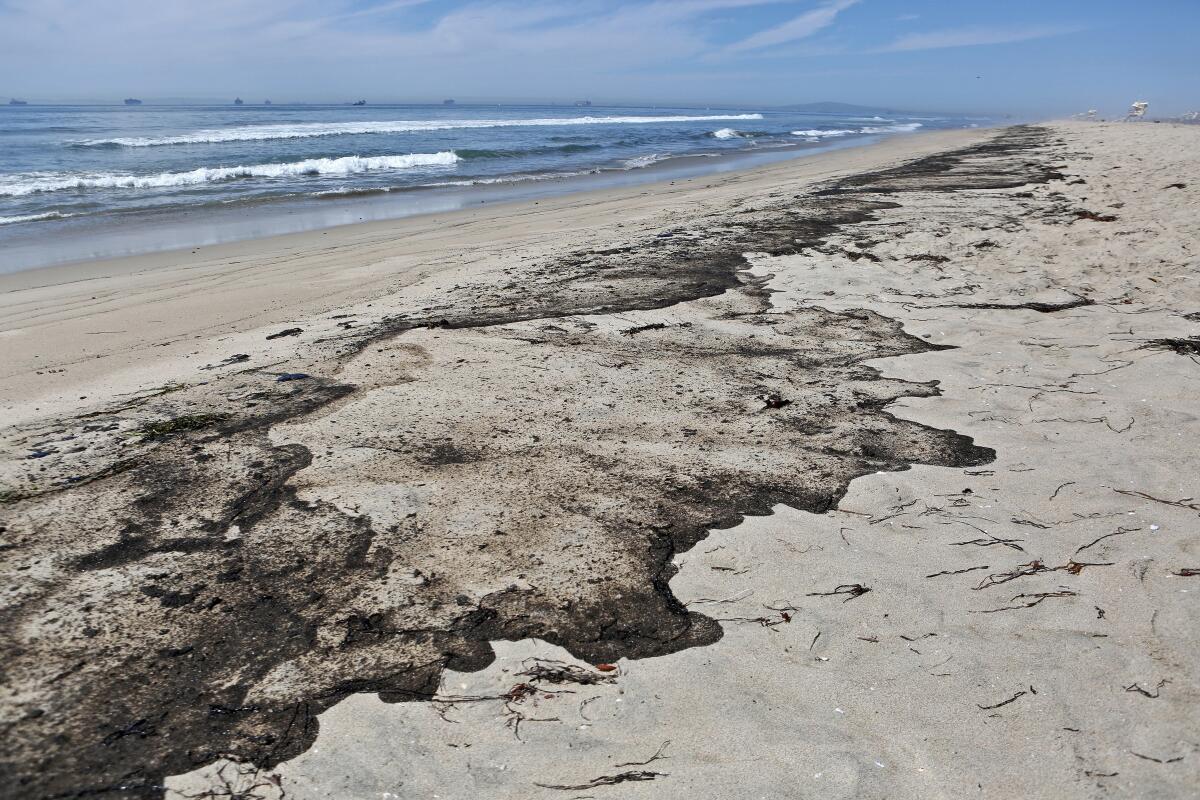Apodaca: It’s time to end offshore oil drilling once and for all

I’ve been through several waves of emotions since learning that an offshore oil spill fouled Orange County’s treasured waters, beaches and wetlands. We’re told that that there are seven stages of grief, but anger has infinite varieties, and I’ve cycled through many of them in the past several days.
The bottom line is that I’m mad as hell about the oil spill, and I think everyone else should be too.
It’s the kind of anger that comes from being misled, ignored and condescended to for far too long by an industry that chases profits with scant regard for the destructive consequences. This is an anger that derives not from some irrational reaction to events beyond our control; rather it is a logical response to a disaster that was entirely predictable and preventable.
Like many of my fellow residents of coastal Orange County, I first knew that something was wrong on the evening of Friday, Oct. 1 when a strange, tar-like odor permeated the air. As we have since learned, the smell emanated from a ruptured oil pipeline near an offshore rig that has since poured an estimated 131,000 gallons of crude into the water.
But as the oil slick spread toward the coastline and toxic globs began polluting county beaches and estuaries, we also learned that there may have been troubling delays in shutting down the leaking pipeline and in notifying authorities.
At press conferences, Martin Welcher, the chief executive of Amplify Energy, the Houston-based owner of the oil platform, resembled a character straight from a central casting call for a corporate suit. He followed the typical playbook for obfuscation, sidestepping reporters’ pointed questions about the timeline of events and issuing vague promises of a thorough investigation.
“I never paid much heed to bees before, other than to run from them in a highly undignified manner whenever I feared being stung. But now I’m worried,” writes Daily Pilot columnist Patrice Apodaca.
This unsatisfactory response was from the leader of a company with a history of bankruptcy and whose subsidiary, Beta Operating Co., the platform operator, was fined by federal regulators in 2013 and 2014 for violations that led to the injury of workers and was issued 125 violations found by federal inspectors.
It speaks to the inordinate power of the fossil fuel industry that a company with a checkered history was operating a 41-year-old pipeline — arguably long past the equipment’s sell-by date — right off our coastline. It’s not surprising that an accident occurred in what is inherently a dangerous business that is often undertaken without sufficiently rigorous oversight.
Yet while there have been no new oil drilling leases given off the California coast in about 50 years, there are still more than 1,200 active oil and gas wells, and the state continues to give permits for drilling covered by old leases.
Oil spills are more common that you might realize, with thousands occurring in U.S. waters every year. Most are small and receive little to no publicity, but even the small ones are harmful to the environment.
The larger spills, as we’ve sadly witnessed, are ecological disasters, and there have been 44 of those since 1969, according to Pete Stauffer, environmental director for the Surfrider Foundation, a San Clemente-based organization dedicated to protecting oceans and beaches.
“There’s a damaging impact on fish and wildlife and plankton,” Stauffer said. “The inner tidal is particularly sensitive. Oil is very difficult to remove from marshlands.
“Those effects can linger for years.”
The economic toll is also severe, and includes not just the costs of cleanup but also the damage to local businesses that rely on a healthy ocean and shoreline environment.
So yes, we have a right to be angry. But any outrage is wasted unless it’s channeled into positive energy.
We know what needs to happen. Offshore oil drilling must be banned, once and for all. It’s simply too risky, too expensive and too harmful. This has been apparent for decades; perhaps now we can finally do something about it.
It’s been suggested that this latest spill is garnering more attention than others because it occurred off the shores of a wealthy and influential county with world-famous beaches. Whether that’s true or not, we could certainly use whatever power we do have to work for needed change.
Some might contend that stopping all offshore drilling would be too costly and complicated, but that argument rings hollow considering the terrible price we pay for continuing. How many more images of birds coated in oil and clumps of poisonous sludge washing up on the sand are we willing to endure?
Last weekend I checked out the shoreline in Huntington Beach. In many ways, it seemed like just another beautiful day in paradise. There was a pleasant, early fall breeze, and the waves crashing on the beach exuded a calming sense of normalcy, even as workers in white uniforms toiled away, cleaning up a mess that should never have happened.
Gazing out at the water, I could see in the distance a long line of massive cargo vessels seemingly stalled at sea, a common sight in recent months as operations at local ports remain backlogged. Questions have been raised about the possibility that it was a ship’s anchor that caused the pipeline to rupture.
Even if that turns out to have been the case, any attempt to deflect responsibility should be swiftly and unequivocally denounced. It’s not the ships that don’t belong in the water.
The oil rigs must go.
All the latest on Orange County from Orange County.
Get our free TimesOC newsletter.
You may occasionally receive promotional content from the Daily Pilot.





